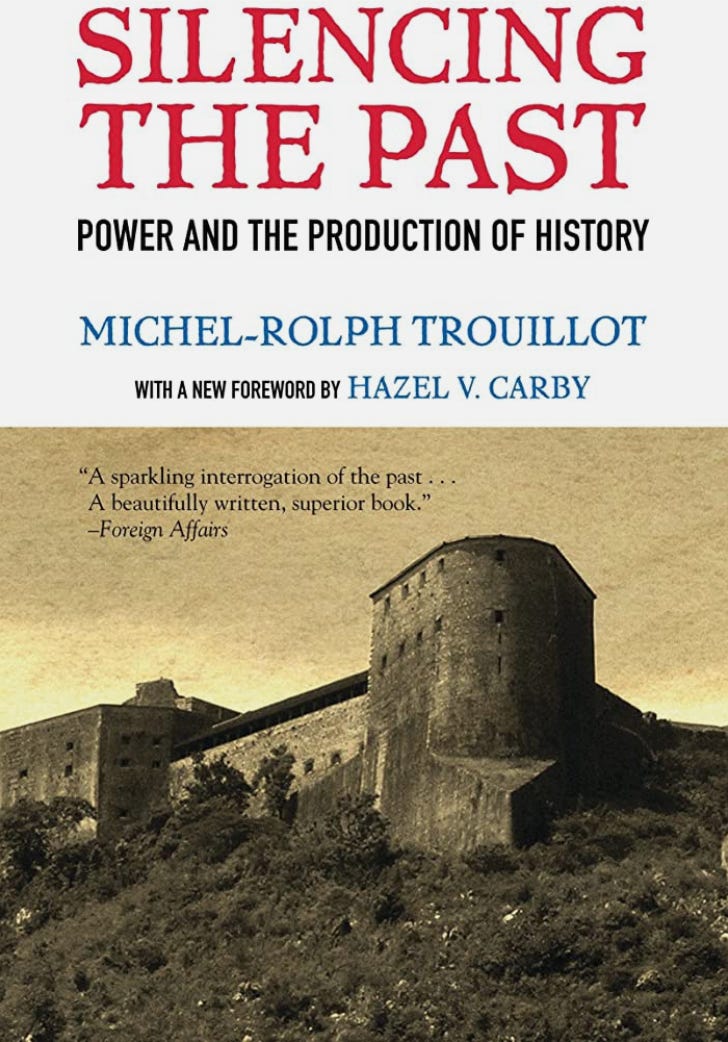There are books and then there are books that you continue to return to for inspiration or because they offer such deep insight into a specific topic that each time you pick it up it reveals something new.
Such is the case with Michel-Rolph Trouillot’s book Silencing the Past: Power and the Production of History (1995). I regret that I only learned about it a few years ago, but for anyone who is interested in historical memory, it is essential reading.
Here are a few select quotes from the text:
History is the fruit of power, but power itself is never so transparent that its analysis becomes superfluous. The ultimate mark of power may be its invisibility; the ultimate challenge, the exposition of its roots. (p. 11)
But the past does not exist independently from the present. Indeed, the past is only past because there is a present, just as I can point to something over there only because I am here. But nothing is inherently over there or here. In that sense, the past has no content. The past -- or more accurately, pastness -- is a position. Thus, in no way can we identify the past as past. (p. 15)
But the past does not exist independently from the present. Indeed, the past is only past because there is a present, just as I can point to something over there only because I am here. But nothing is inherently over there or here. In that sense, the past has no content. The past - or more accurately, pastness - is a position. Thus, in no way can we identify the past as past. (p. 20)
To put it differently, any historical narrative is a particular bundle of silences, the result of a unique process, and the operation required to deconstruct these silences will vary accordingly. (p. 27)
I prefer to say that Columbus ‘stumbled on the Bahamas,’ or ‘discovered the Antilles,’ and I prefer ‘conquest’ over ‘discovery’ to describe what happened after the landing. Such phrasings are awkward and may raise some eyebrows. They may even annoy some readers. But both the awkwardness and the fact that the entire issue can be dismissed as trivial quibbling suggests that it is not easy to subvert the very language describing the facts of the matter. For the power to decide what is trivial—and annoying—is also part of the power to decide how ‘what happened’ becomes ‘that which is said to have happened.’ (p. 115)
The value of a historical product cannot be debated without taking into account both the context of its production and the context of its consumption. (p. 146)
Professional historians have made good use of the creation of the past as a distinct entity, a creation that paralleled the growth of their own practice. That practice, in turn, reinforced the belief that made it possible. The more historians wrote about past worlds, the more The Past became real as a separate world. But as various crises of our times impinge upon identities throught to be long established or silent, we move closer to the era when professional historians will have to position themselves more clearly within the present, lest politicians, magnates, or ethnic leaders alone write history for them. (p. 152)
But we may want to keep in mind that deeds and words are not as distinguishable as often we presume. History does not belong only to its narrators, professional or amateur. While some of us debate what history is or was, others take it into their own hands. (p. 153)
Silencing the Past is not easy reading, but it will most definitely be a rewarding experience if you are willing to read slowly, carefully, and spend the necessary time reflecting.





Kevin,
Thank you for sharing this, I will have to get the book. I take the same approach in my book, “Mine Eyes Have Seen the Glory: Religion and the Politics of Race in the Civil War Era and Beyond.” Our past is often uncomfortable, it was for me. My family were early settlers in what became West Virginia, and the were slave owners who fought for the Confederacy.
Charles Dew, author of “Apostles of Disunion: Southern Secession Commissioners and the Causes of the Civil War” wrote of my book: “Mine Eyes Have Seen the Glory is a book for our time. Steven L. Dundas has skillfully woven slavery, race, racism, politics, and religion into a single entity in telling this country’s complex story. Every American would profit from reading what he is telling us.” I hope that my book will one day be thought about in the way you discuss Mr. Troulliot’s work.
Thank you again.
Steve